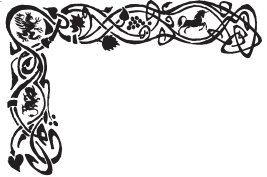







Howard may not have been a practicing classicist, but there's no denying his philosophy shows more in common with Nietzsche, to whom the tension between Dionysus and Apollo is paramount. Apollo - or social order - is never reality, and ancient shrines encrusted by gnarled vines speak of lost glories. Apollo is a vision of perfection and is nothing without the primeval urge of the unconscious, animal state of being.
That's putting Nietzsche in a very Howardian setting of lost cities and the untamed barbarian. Nietzsche was a classicist, but he thought the classical moment was already over when Dionysus, the god of countryside revelry and gay pursuits, was no longer ingrained in the unconscious spirit (about the time of Euripides), and empty Apollonian pursuits of social civil life dominated (ring any bells?)
Dionysus may be gay, but his frolicsome ways depend on the dark goddesses of degeneration and renewal. Of Artemis of the moon, Diana of the hunt and the moon, Proserpine of the underworld and of spring (Ceres). This attitude of death and renewal is the opposite of Apollo. Where I think there is a connection is that Apollo is actually emptiness, and classicism needs the lustiness of Dionysus. The pillars and pediments of our civilization are not the truth. The truth has a melancholy aspect. But melancholy also speaks of spring and revival. There is no true gaiety without darkness, only emptiness.
An awareness of the unconscious – home of Apollonian vision and Dionysian lust - is therefore called for. Jung’s quote on the “bad” and “good” dragon is as good a place as any
Those who think base the world on thought, those who feel, on feeling. You find truth and error in both. The way of life writhes like the serpent from right to left and from left to right, from thinking to pleasure and from pleasure to thinking. Thus the serpent is an adversary and a symbol of enmity, but also a wise bridge that connects right and left through longing, much needed by our life.
The unconscious reflects the universe, or the world of action. So what is this all about? That a universe of action and degradation is basically different, and the difference is exotic. You are essentially in a different state of being; what we mean by healthy is basically care or even cosseting. In the alternate universe there is a massed power of living shapes that eat and are eaten or that degrade and renew.
For example, in Henry VII’s time courtiers ate “curlews, plovers, lapwings, sandpipers, mallards, teals, bittern and cranes.” (Henry VII and the Making of Tudor England, Steven Gunn, OUP 2017) That speaks of fens, swamps, royal forests, huntsmen and gamekeepers (Alternates 8)
SCARBOROUGH FAIR
There are abundant supplies of liverworts and apothecarian items; the enchanted forest of Olde Englande. Also melancholy, nostalgic eroticism. There are a mixture of things in there. Would that old lifestyle give you what might be called health? Well, it’s a leading question.. If we live in an ego-fixated era, a psychosis of hidden dragonspawn, then we are not psychologically perfectly fit, it doesn’t matter what “they” tell us. If we live an allotted span but fail to connect to our being beyond the ego, that is not very healthy. The psyche has an affinity with the living shapes that are powered by a universal process of pungency, of weirdness.
Things are much weirder than modern people think; it’s just that that aspect of life is shut down. Even sex is slightly weird but we choose to keep it in sterile, confined places. Also, sterilized sex is machine-sex, same difference. If it was broadened to have an ultra-sensual environment, that would be more interesting. Roger Vadim’s film Barbarella is that sort of future (Alternates 6). If you go back to old societies they for sure were pungent, florid (maybe horrid), more animal-like in open displays of sexuality. R Crumb’s illustrations to Boswell’s 18th century London Diaries are probably pretty accurate. Byron from the same era was fantastically profligate. What I mean is the entire tenor of the society was much more openly sensuous and it was basically hanging out a lot more, coarser, cruder.
Essentially, the animal-nature of people in the modern era has become secondary or eclipsed by the machine/robot. This is where I think Zappa’s musicals might come in, acting you could say in a 17th or 18th century fashion. If old societies are filthy and lewd and so forth, I’d say there’s an odd affinity with Zappa, who is filthy and lewd. The animal nature is not hidden or driven by psychosis. He is what you might call Dionysian. The filth he throws is aimed at hidden filth, especially his bete noir of Christian Right secret fornicators in Broadway the Hard Way, so you could say it’s clean filth.
Zappa’s lewdness pulverizes sanctimonious fornicators whose hands are clean but whose grubby dragon talons reel in street meat to feed their lascivious alter egos. Their cleanliness is foulness personified, while Zappa’s well-aimed filth obeys a time-lost process of pungent wit, coarse satire, crude, biting, caustic critique of the “powers that be” (who have no natural power or zest). Brio.
The dragon of vileness – illustrated on CforA – belches tongues of ego-fire in grey, sterile canyons. You can take that to represent the setting for technique, from DNA-editing to nano-bots and cyber-AI. It’s the sterility of an infertile world and the only thing that spawns is dragonspawn. We may not see it because it’s hidden in a psychotic, sterile setting. If you go back to the quote from Spenser’s Faery Queene (Aspects 1), it is there that the voluptuous enchanted forest reveals its opposite for the vileness it is
Huge heapes of mudd he leaves, wherein there breed
Ten thousand kindes of creatures, partly male
And partly female of his fruitfull seed;
Such ugly monstrous shapes elsewhere may no man reed. Canto 1, 21
The secret psychosis spawns an ego-lust of crazed DNA-editing and cyber-AI-ing; an upsrising of distorted filth on a world sterilized by the belching flames of egomaniacal techniques. Yes, it’s the techniques themselves that sterilize our previously abundant milky-fair fields and maidens.
How so? Well, techniques are not unknown in nature; if you look for them they’re probably there. Birds migrate by magnetic-detectors (in their brains, I guess); spiders spin; flowers supply nectar for bees; rabbits burrow for protection; fish swim and birds fly. There must be numerous techniques out there in our previously milky-fair fields and sea-green coasts. You’ll notice I say that “spiders spin”; the technique is the spinning and it’s done by the spider. So it’s not like you have this thing called spinning that just goes on by itself. So, therefore, you need a spider first. The spider has a physique; round body, square head with mandibles, a few eyes, eight legs (related to crustaceans).
OK, so where does the physique come from? From the universe, as previously stated. DNA is a technique like spinning. A physique is a counterbalance of opposing forces, a song written by nature. Like an acrobat, everything is in a state of balance; there is an atmospheric vitality and marvellous symmetry. Where does all this come from? It’s hammered in place by primeval rhyhms that never ever change.
Technique – or fact – basically blind you to what is occurring which is simple, fruitful and – if it happens to be Frank Zappa – caustic and rude beyond all bearing. This is why the sterility of technique is vileness personified and justifies the hurling of venomous innuendos and filth-laden slurs at the rabble who dabble in what is a type of mass-psychosis, dragon-flame breathing down their scrawny necks.
The result – a sterilized world of numerous techniques – is before our eyes. Where is the vicious pungency of hunting otters in nameless creeks; where the whir of kingfisher wings; the ripple of longgrass in the morning breeze; the sweeping scythe that bundles hay for cattle; the bison that roam the plains and the larger eco-culture of horse, cowboy, steers, Indians?
This is the lost world of animal physique, of fauna and flora, of dirt-soiled cowboys on dog-tired mares, of slinky Indians on dog-tired bays, of Man, muscle and mount, of squaws leaning on doors, of the ancient prairies that can still breath the fire of life that repels the acrid fumes of a world-devouring psychosis that is sterile to the touch, infertile to the gaze of Man, a type of nothingness.
EARTH MOTHER